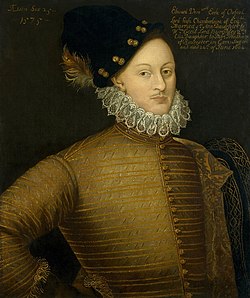
Back النظرية الأوكسفوردية حول أصالة شكسبير Arabic Teoría oxfordiana de la autoría de Shakespeare Spanish

The Oxfordian theory of Shakespeare authorship contends that Edward de Vere, 17th Earl of Oxford, wrote the plays and poems of William Shakespeare. While historians and literary scholars overwhelmingly reject alternative authorship candidates, including Oxford,[1][2] public interest in the Oxfordian theory continues.[3] After the 1920s, the Oxfordian theory became the most popular alternative Shakespeare authorship theory.[4][5]
The convergence of documentary evidence of the type used by academics for authorial attribution – title pages, testimony by other contemporary poets and historians, and official records – sufficiently establishes Shakespeare's authorship for the overwhelming majority of Shakespeare scholars and literary historians,[6] and no such documentary evidence links Oxford to Shakespeare's works. Oxfordians, however, reject the historical record and claim that circumstantial evidence supports Oxford’s authorship,[7] proposing that the contradictory historical evidence is part of a conspiracy that falsified the record to protect the identity of the real author.[8][9] Scholarly literary specialists consider the Oxfordian method of interpreting the plays and poems as grounded in an autobiographical fallacy, and argue that using his works to infer and construct a hypothetical author's biography is both unreliable and logically unsound.[10][11][12][13][14]
Oxfordian arguments rely heavily on biographical allusions; adherents find correspondences between incidents and circumstances in Oxford's life and events in Shakespeare's plays, sonnets, and longer poems.[15] The case also relies on perceived parallels of language, idiom, and thought between Shakespeare's works and Oxford's own poetry and letters. Oxfordians claim that marked passages in Oxford's Bible can be linked to Biblical allusions in Shakespeare's plays.[16] That no plays survive under Oxford's name is also important to the Oxfordian theory.[17] Oxfordians interpret certain 16th- and 17th-century literary allusions as indicating that Oxford was one of the more prominent suppressed anonymous and/or pseudonymous writers of the day. Under this scenario, Shakespeare was either a "front man" or "play-broker" who published the plays under his own name or was merely an actor with a similar name, misidentified as the playwright since the first Shakespeare biographies of the early 1700s.
The most compelling evidence against the Oxfordian theory is de Vere's death in 1604, since the generally accepted chronology of Shakespeare's plays places the composition of approximately twelve of the plays after that date. Oxfordians respond that the annual publication of "new" or "corrected" Shakespeare plays stopped in 1604,[18] and that the dedication to Shakespeare's Sonnets implies that the author was dead prior to their publication in 1609. Oxfordians believe the reason so many of the "late plays" show evidence of revision and collaboration is because they were completed by other playwrights after Oxford's death.
- ^ Blakemore 2011, quoting William Hunt: "No, absolutely no competent student of the period, historical or literary, has ever taken this theory seriously. First of all, the founding premise is false – there is nothing especially mysterious about William Shakespeare, who is as well documented as one could expect of a man of his time. None of his contemporaries or associates expressed any doubt about the authorship of his poems and plays. Nothing about De Vere (Oxford) suggests he had any great talent, and there is no reason to suppose he would have suppressed any talents he possessed."
- ^ Proudfoot, Richard; Thompson, Ann; Kastan, David Scott, eds. (5 July 2001). The Arden Shakespeare Complete Works. London: Arden Shakespeare. p. 3. ISBN 1-903436-61-3..
- ^ Niederkorn, William S. (10 February 2001). "A Historic Whodunit: If Shakespeare Didn't, Who Did?". The New York Times. Archived from the original on 21 February 2009. Retrieved 2 October 2008 – via Shakespeare Fellowship.
- ^ Shapiro 2010, p. 214.
- ^ McMichael & Glenn 1962, p. 159.
- ^ Wadsworth 1958, pp. 163–164:McCrea 2005, pp. xii–xiii.
- ^ Shapiro 2010, p. 7.
- ^ Shapiro 2010, p. 276.
- ^ Love 2002, pp. 199, 203–207.
- ^ Shapiro 2010, pp. 304–313.
- ^ Bate 1998, p. 90: "Their [Oxfordians'] favorite code is the hidden personal allusion ... But this method is in essence no different from the cryptogram, since Shakespeare's range of characters and plots, both familial and political, is so vast that it would be possible to find in the plays 'self-portraits' of, once more, anybody one cares to think of."
- ^ Love 2002, pp. 87, 200: "It has more than once been claimed that the combination of 'biographical-fit' and cryptographical arguments could be used to establish a case for almost any individual ... The very fact that their application has produced so many rival claimants demonstrates their unreliability."
- ^ Schoone-Jongen 2008, p. 5: "in voicing dissatisfaction over the apparent lack of continuity between the certain facts of Shakespeare's life and the spirit of his literary output, anti-Stratfordians adopt the very Modernist assumption that an author's work must reflect his or her life. Neither Shakespeare nor his fellow Elizabethan writers operated under this assumption."
- ^ Smith 2008, p. 629: "... deriving an idea of an author from his or her works is always problematic, particularly in a multi-vocal genre like drama, since it crucially underestimates the heterogeneous influences and imaginative reaches of creative writing."
- ^ Bate 1998, p. 90.
- ^ Shapiro 2010, p. 244.
- ^ Looney 1920, pp. 125–126.
- ^ Anderson 2005, p. 399.